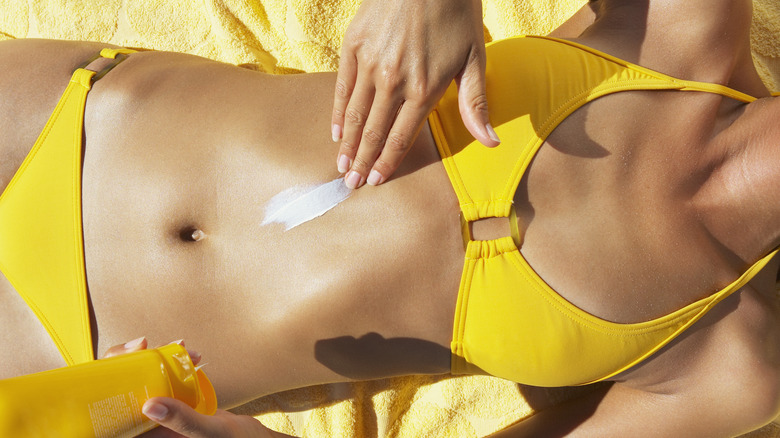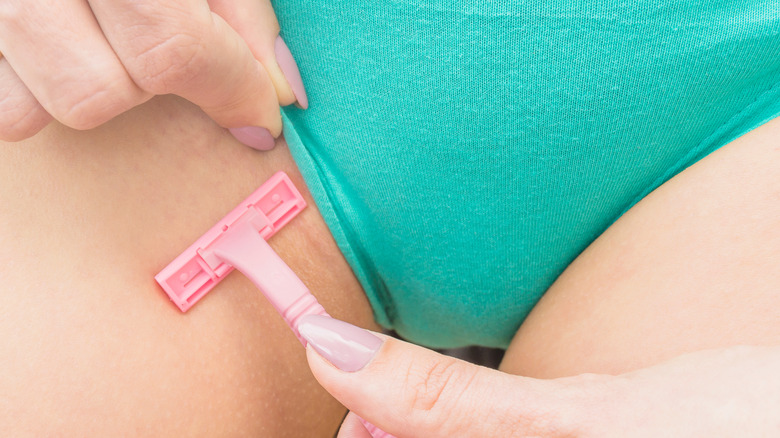Facing Your Most Intimate Summer Concerns Head On (Because Sand Down There Is No Fun)
Ah, summer has arrived, and beach season is upon us. Or lake season or pool season. Wherever you happen to be, you're going to want to be near at least one type of water source considering scientists expect record heat all over the world this summer.
But as much as the summer is a lot of fun, if you have a vagina, you can run into some issues. You may love lounging around in your bathing suit all day or having a romp on the beach with your summer fling, but your vagina does not. If anything, while your body is soaking up the vitamin D (with your SPF on hand at all times) and your mind is set on making the most of the next three months, your vagina is actually quite anti-summer. Because of this, you want to do whatever you have to do to make sure your vagina health is kept in shape until Labor Day rolls around and we wave hello to autumn.
Here are five things that could pop up this summer and how to remedy them.
Sand in your vagina
If you've never experienced a sandy vagina or vulva, thank your lucky stars because ouch. Well, not so much an ouch — but an annoyance that can become an ouch if you don't take care of yourself. Even if you're not at a nude beach, getting sand in your vulva can happen if you're sitting on the shore without a towel, building a sand castle with your niece, or just going for a swim when the waves are really crashing — those things will toss you around and pile up the sand in your crotch like you wouldn't believe. If you opt for having sex, especially penetration on the beach, then we're not just talking vulva sand, but vagina sand, as in the sand gets in your vaginal canal and can do some harm.
"[Sand] may cause micro-abrasions, or tiny injuries or scratches, which can be really uncomfortable," OB-GYN Karen Duncan, M.D. tells Refinery 29. "It can be problematic, and it can happen if you're sitting in the sand or especially if you're getting a little frisky."
Should you end up with sand in your vagina, leave it alone. Your vagina knows how to take care of itself and will make sure the sand will work its way out of your body eventually. Whatever you do, don't douche! Douching will push the sand further into your vaginal canal, throwing the pH balance off and possibly resulting in a yeast infection or bacterial vaginosis (BV).
If the sand is just in and around your vulva, splashing some water over the area when you shower is sufficient.
Staying in your wet bathing suit all day
Although your vagina likes to be wet, it's kind of snobby about what kind of wet — meaning it's not going to stand for anything that isn't its own lubrication. Sitting around at the beach or by the pool all day in your wet suit is an open invitation to bacteria that causes problems like yeast infections, BV, or UTIs depending on what's floating around in that water source. The best thing to do is when you're done swimming, immediately take off your suit and put on breathable underwear (cotton is always the best choice) before getting dressed. Or, even better, go commando: It's not only a healthy option in the summer but can make you feel sexy and confident.
It's also important to realize that your bathing suit should be washed after every time you wear it. Putting an unwashed bathing suit on, even if it's dry, can still harbor bacteria that lead to infection. The Mayo Clinic recommends that underwear and bathing suits be washed in very hot water and with about half the amount of detergent that you would use when doing a load of regular laundry. It's essential to clean out any microbes that might be hanging around before you wear them again. Remember: A yeast infection or UTI means no sex for up to two weeks. So, if you're having yourself a hot (and fleeting) summer fling, you want to take this into consideration.
Pubic hair removal
Whether you wax off every strand of pubic hair, go full bush, or shave a heart into it for your partner is your choice. No one should be telling you what you should be doing with your body hair. But if you're jumping on the pubic hair removal train, especially just because it's bathing suit season, then you need to be well aware of the possible implications that can come with it. While ingrown hairs can be a problem all year, when you're dealing with a wet swimsuit combined with the summer heat and humidity that inevitably leads to a very swampy crotch, you're upping your chances of razor burn and rashes in general.
A good way to get around that and keep irritations to a minimum is to put cornstarch on the area right after you shave — a technique a lot of estheticians and waxing specialists do in the summer. No matter how much or little you shave the pubic area in the summer, the key is to keep it as dry as possible, especially along the bikini line where chafing can develop. If chafing does occur, washing the area with soap and water, drying it, then applying aloe vera should help, via Cleveland Clinic. Definitely stay away from scented lotions or other substances known to trap moisture like Vaseline.
Dehydration-related problems
Although we already know how important it is to drink every day, when the summer months come to town, you should be drinking even more of it. Even if you're not feeling parched in your mouth, as you sweat you lose water from your body and your body needs to stay hydrated if it's going to function properly. Drinking alcohol at the beach or during a hot night on some rooftop bar? Then you definitely want to up your water intake by drinking a glass of water in between every alcoholic drink you have.
If you let yourself get dehydrated, then your vagina will too. A dehydrated vagina can't lubricate successfully on its own, thereby making sex painful and possibly causing tears on the vulva and inside the vaginal walls. The tears make the vagina susceptible to infections. Even if you're not sexually active, vaginal dryness can increase your chances of yeast infections, as well as UTIs. So as much as you want to keep things dry between your legs, you also want to keep supplying your body with water so the natural vaginal lubrication can keep the pH balance in check and everything working as it should.
Consider being proactive
Because so many of the intimate summer concerns come down to vaginal infection, you can get in front of the problem by working probiotics into your diet. This can involve taking probiotics in pill form or by incorporating certain foods into your meals like yogurt, sauerkraut or kimchi. Granted, this doesn't mean you'll completely eliminate any chances of infections, but it can decrease those chances. If you do suspect that you have an infection, don't self-diagnosis or try to treat it at home. Instead, get to your doctor. Because of the humidity factor that comes with vaginas in the summer, what you think might be a simple yeast infection could actually be bacterial vaginosis. Treatment for BV requires prescription cream or oral medication from your doctor.
Although vaginal health is always important, because the summer can do a number on your vagina and vulva, you want to step up your wellness routine so you can enjoy the season with as few vagina-related setbacks as possible.





